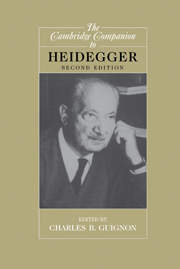Book contents
- Frontmatter
- Introduction
- 1 The question of being: Heidegger’s project
- 2 Reading a life: Heidegger and hard times
- 3 The principle of phenomenology
- 4 Time and phenomenology in Husserl and Heidegger
- 5 Laying the ground for metaphysics: Heidegger’s appropriation of Kant
- 6 Heidegger and the hermeneutic turn
- 7 Engaged agency and background in Heidegger
- 8 Death, time, history: Division II of Being and Time
- 9 Truth and the essence of truth in Heidegger’s thought
- 10 Authenticity, moral values, and psychotherapy
- 11 Heidegger, Buddhism, and deep ecology
- 12 Heidegger and theology
- 13 Heidegger on the connection between nihilism, art, technology, and politics
- 14 The fourfold
- Bibliography
- Index
- Series List
5 - Laying the ground for metaphysics: Heidegger’s appropriation of Kant
Published online by Cambridge University Press: 28 March 2007
- Frontmatter
- Introduction
- 1 The question of being: Heidegger’s project
- 2 Reading a life: Heidegger and hard times
- 3 The principle of phenomenology
- 4 Time and phenomenology in Husserl and Heidegger
- 5 Laying the ground for metaphysics: Heidegger’s appropriation of Kant
- 6 Heidegger and the hermeneutic turn
- 7 Engaged agency and background in Heidegger
- 8 Death, time, history: Division II of Being and Time
- 9 Truth and the essence of truth in Heidegger’s thought
- 10 Authenticity, moral values, and psychotherapy
- 11 Heidegger, Buddhism, and deep ecology
- 12 Heidegger and theology
- 13 Heidegger on the connection between nihilism, art, technology, and politics
- 14 The fourfold
- Bibliography
- Index
- Series List
Summary
A philosophy comes to have true validity, when its own power is released and the possibility is provided for it to deliver a shock and to make a difference.
(PIK 3)HEIDEGGER AND KANT’S “COPERNICAN REVOLUTION”
In Section 4 of Being and Time, Heidegger proposes that in order to answer the question what being means, we must first investigate the nature of our own existence. But why should this be so? At first blush, it is highly counterintuitive. After all, being is, in the words of Being and Time, “what determines entities as entities” (SZ 6). Being is whatever is characteristic of anything simply in so far as it is. Ontology is a general account of being. To do ontology, one might therefore naturally think, we must survey the full range of entities and generalize to an account of what all entities have in common. In other words, ontology could be an intellectual discipline parallel with biology and philology: a direct study of some domain of objects. Whereas biology studies objects in so far as they are alive, ontology would study them in so far as they quite simply are. Now, we do not have to do a preliminary investigation into our own existence in order to do biology; so, why should such a procedure be called for in the case of ontology?
- Type
- Chapter
- Information
- The Cambridge Companion to Heidegger , pp. 149 - 176Publisher: Cambridge University PressPrint publication year: 2006
- 4
- Cited by



